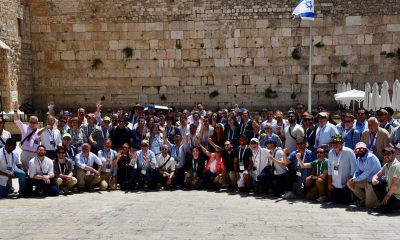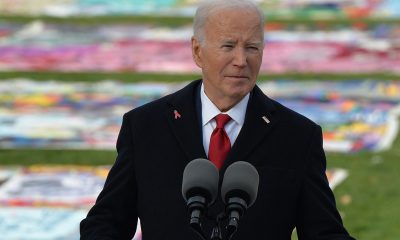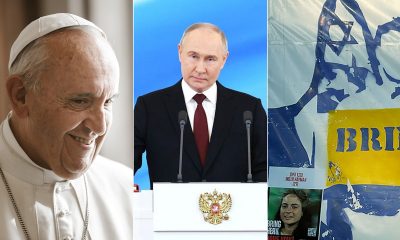Middle East
Israel lifts MSM blood donor restrictions
A Wider Bridge celebrated ‘landmark moment’
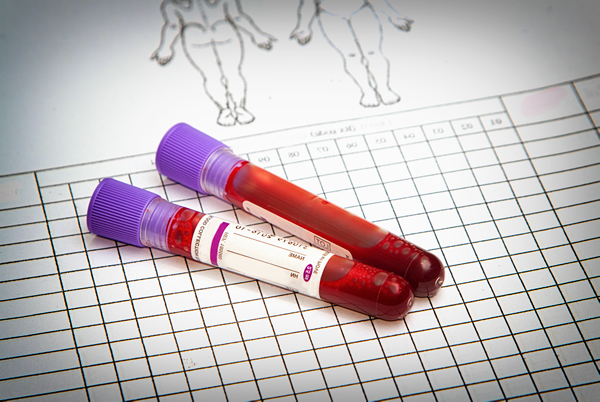
JERUSALEM — Israel on Thursday announced it will allow men who have sex with men to donate blood without restrictions.
The Associated Press reported Health Minister Nitzan Horowitz, who is openly gay, made the announcement.
“Today we removed the degrading and irrelevant questions in the blood donation questionnaire,” wrote Horowitz in his Facebook post. “Every blood donor who comes with the goal of saving a life will receive equal treatment, no matter what his gender or sexual orientation (is), whether he is LGBT or straight.”
A Wider Bridge — a U.S.-based organization that describes itself as “building a movement of LGBTQ people and allies with a strong interest in and commitment to supporting Israel and its LGBTQ communities” — welcomed the announcement.
“This is a landmark moment for the entire LGBTQ community in Israel and a step closer toward equality for everyone,” said A Wider Bridge on its Facebook page.
Israel is the latest country that has lifted restrictions for MSM who want to donate blood.
The U.S. Food and Drug Administration currently allows MSM to donate blood if they have not had sex with another man for three months. The FDA deferral period for MSM before April 2020 was a year.
Iran
Underground queer network challenges Iranian regime
Homosexuality remains punishable by death in country

While global powers negotiate with Iran’s regime under Ayatollah Ali Khamenei to curb its advancing nuclear program, the oppressed LGBTQ+ community is building and operating a secret underground network to resist state-coerced sex reassignment surgeries.
These surgeries, mandated for gay and lesbian people as a state-sanctioned alternative to execution for homosexuality, are part of Iran’s penal code that criminalizes consensual same-sex sexual relations. The network provides safe houses, forged identification documents, and covert communication channels to protect members from government raids and imprisonment.
Precise data on LGBTQ+ people prosecuted in Iran for resisting state-coerced sex reassignment surgeries over the past decade remains elusive, as the regime’s opaque judicial system obscures such cases under vague charges like “corruption on earth” or “sodomy.” NGOs, including 6Rang, report that thousands of gay and lesbian Iranians face pressure to undergo surgeries to avoid execution for same-sex conduct, with resistance often leading to arrests or harassment for violating gender norms.
Zahra Seddiqi Hamedani and Elham Choubdar, two prominent activists, in 2022 were sentenced to death for their social media advocacy, charged with “corruption” and “human trafficking,” though their convictions were overturned in 2023. Similarly, Rezvaneh Mohammadi in 2019 received a five-year sentence for promoting “homosexual relations,” a charge hinting at resistance to the regime’s heteronormative mandates.
Arsham Parsi in 2003 escalated his clandestine fight for Iran’s LGBTQ+ community by launching Voice Celebration, a secret Yahoo chat group where 50 queer Iranians, using aliases, exchanged coded messages to evade the regime’s surveillance. Operating like operatives in a shadow network, participants shared text messages about human rights and survival tactics, knowing a single breach could lead to torture or execution. Parsi, then 23, orchestrated the group’s encrypted communications, building a virtual lifeline that connected isolated individuals across the country until his cover was nearly blown, forcing a desperate escape in early 2005.
Parsi in an exchange with the Los Angeles Blade revealed a defiant undercurrent in Iran, a movement too elusive to be called traditional resistance yet pulsing with covert rebellion against the regime.
The state’s relentless push to force gay men into coerced surgeries — marketed as a “solution” to their sexuality — seeks to erase their identities through enforced conformity. Parsi, steering the International Railroad for Queer Refugees, disclosed how queer Iranians fight back with clandestine measures: Underground education to counter state propaganda, discreet psychological support to fortify resilience, and encrypted networks to forge secret alliances. These efforts, veiled to evade regime detection, dismantle the state’s narrative with every hidden signal and guarded connection.
“We are working to create a true grassroots resistance by empowering people to understand their identity, seek safe alternatives, and reclaim their agency despite the oppressive context,” said Parsi. “The Iranian regime’s policies are built on denial of sexual orientation and a forced alignment with a binary gender model.”
“Rather than recognizing gay, lesbian, or bisexual individuals, the system pressures them — particularly gay men — to undergo irreversible surgeries in order to be legally tolerated,” he added. “This systemic violence creates deep psychological harm and compels many to resist, even quietly, to protect their truth. The lack of legal recognition and the threat of arrest, harassment, or blackmail fuels the underground defiance we see today. It’s not only resistance for survival — it’s a rejection of state-imposed identity suppression.”
IRQR, guided by Parsi, for nearly two decades has operated as a lifeline, orchestrating daring escapes and running a covert network for Iran’s hunted queer community.
Parsi said his work relies on secret, encrypted channels — meticulously managed to avoid detection — to funnel at-risk individuals to safety, smuggle life-saving information, secure hidden safe houses, and deliver emotional support. Every operation faces threats not only from the regime’s security forces but also from Basij militia operatives who masquerade as queer individuals to infiltrate networks, heightening the peril for those marked by their identities.
Black-clad Basij militia members respond at the first signs of defiance; tearing through crowds on motorcycles with batons and guns at the ready, poised to crush any challenge to Iran’s regime. These paramilitary volunteers, bound by fierce loyalty to the Islamic Republic, serve as the state’s enforcers, their plainclothes operatives slipping into dissident networks to root out the defiant.
The Basij fill queer Iranians with dread; their so-called morality patrols and digital traps stalking those who dare to exist outside the regime’s rigid norms.
“Their goal is not only to gather intelligence but to undermine, divide, and cancel the work of activists and organizations like ours,” said Parsi. “This divide-and-conquer strategy is designed to break solidarity and generate mistrust.”
“We have seen numerous cases where trusted circles were compromised by these informants, and it has made our work — and survival — even more complex,” he further noted. “Despite this, we persist. Through our underground connections, we have helped thousands of queer Iranians seek safety, community, and ultimately, freedom.”
Parsi told the Blade that international support — through funding, advocacy, policy pressure, or amplifying his stories — can significantly strengthen his work to protect Iran’s persecuted queer community. He emphasized IRQR operates with limited resources, making global solidarity essential to improve outreach, enhance safety measures, and respond swiftly to those in need. Parsi underscored such support brings visibility to the crisis in Iran, reminding those at risk they are not forgotten while exerting pressure on a regime that thrives on silence and fear.
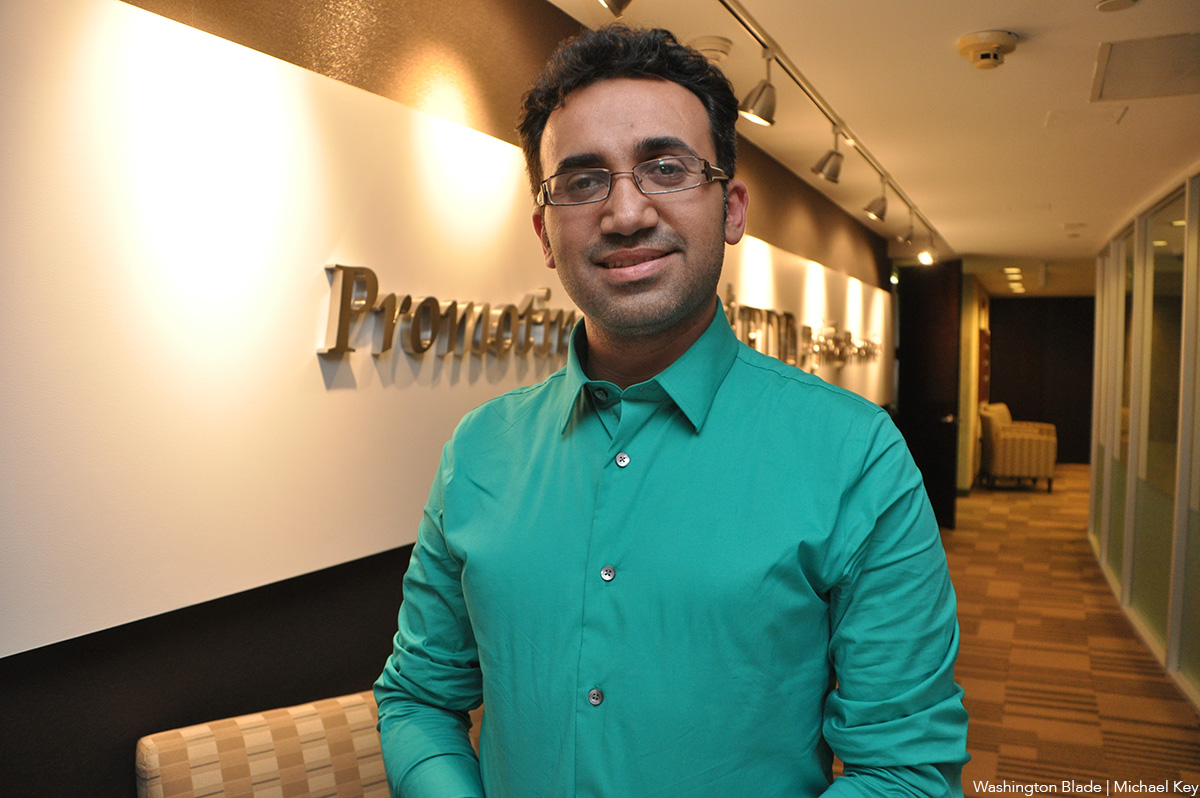
One of the things that Parsi’s underground network offers is online workshops that educate queer Iranians about how they can remain beyond the regime’s reach.
He said these sessions, designed for safety and accessibility, encompass peer support, mental health education, digital security training, and guidance on refugee pathways. Parsi explained the workshops give vulnerable Iranians the tools to navigate persecution, defy state surveillance, and pursue escape, exposing the resilience of a community under relentless scrutiny.
“Due to the high risk of persecution in Iran, traditional protests are not feasible,” said Parsi. “Instead, acts of resistance take quieter forms — like anonymous storytelling which are just as powerful in building awareness and connection within the community. While discreet, these activities help create a sense of solidarity and empowerment among queer Iranians.”
Parsi, undeterred by Iran’s unyielding regime, asserted with measured confidence that while underground acts of defiance — living authentically, supporting one another, resisting forced medicalisation — may not shift policy overnight, they are already improving lives. He stressed these quiet rebellions that queer Iranians stage challenge the regime’s narrative of shame and invisibility, forging a resilient foundation for future change. Each act, Parsi emphasized, dismantles the regime’s grip, offering hope to those navigating a landscape of relentless oppression.
“At IRQR, we view each life saved, each network built, and each truth spoken as a small but powerful act of resistance,” said Parsi. “These are the seeds of future liberation. Over time, as they multiply and gain visibility — locally and internationally — they will help reshape the landscape for queer Iranians.”
ILGA Asia Executive Director Henry Koh said queer Iranians’ underground resistance is a powerful assertion of bodily autonomy and self-determination. He described it as a deeply courageous act in a regime where visibility invites immense personal risk, from arrest to execution.
When asked by the Blade if the Iranian regime’s punitive measures against openly queer people fuel underground resistance, Koh responded unequivocally.
“Absolutely,” he said. “The climate of criminalization and repression leaves little safe space for queer people to live openly. This forces many into secrecy or underground networks as a means of survival, resistance, and mutual support. Such conditions are not only unjust but also profoundly harmful to the well-being of LGBTIQ+ individuals.”
“It is important to distinguish between affirming gender-affirming care and any form of coercive medical intervention,” he added. “When states or authorities mandate medical procedures as a condition for recognition or safety, it constitutes a grave violation of human rights. Gender identity is deeply personal, and no institution should override an individual’s self-defined identity.”
Israel
ILGA World suspends Israeli advocacy group after bid to host conference withdrawn
Decision has prompted praise, criticism
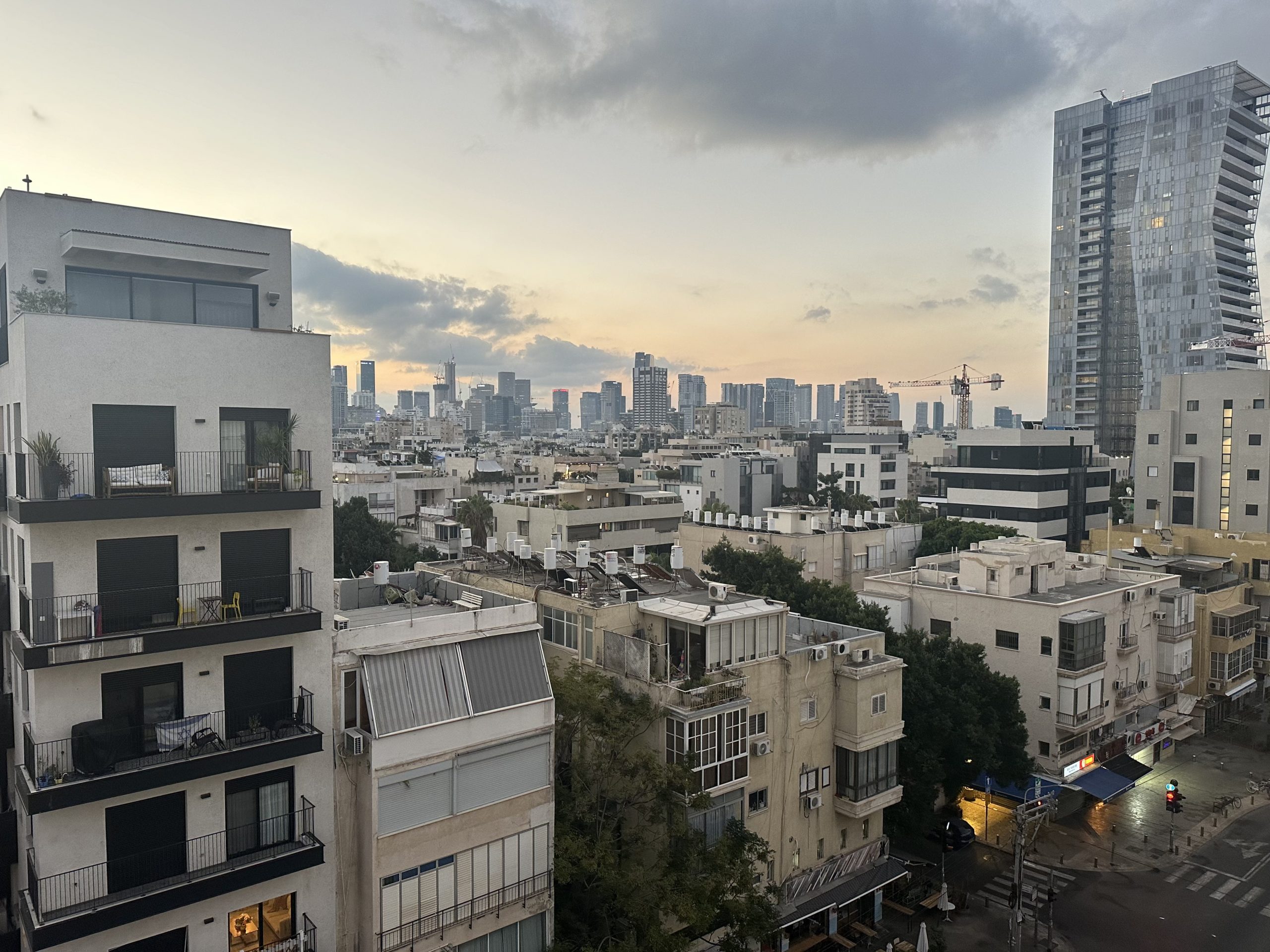
ILGA World has suspended an Israeli advocacy group after it withdrew its bid to host its conference in Tel Aviv.
The Aguda, the Association for LGBTQ+ Equality in Israel, had bid to host the 2026/2027 ILGA World Conference. The ILGA World board of directors was to have voted on the proposal at the 2024 ILGA World Conference 2024 that will take place in Cape Town, South Africa, from Nov. 11-15.
ILGA World on Tuesday announced “the bid to host our next World Conference in Tel Aviv will not go forward, and will not be put to a vote at the upcoming World Conference.” The announcement notes the ILGA World Board “held an emergency meeting and unanimously decided to remove the bid from the Aguda from consideration, and it has also decided to suspend the organization from our membership.”
The announcement further says the Aguda’s bid “was found in violation of ILGA World’s aims and objectives set out in our constitution (3.1 and 3.2.)”
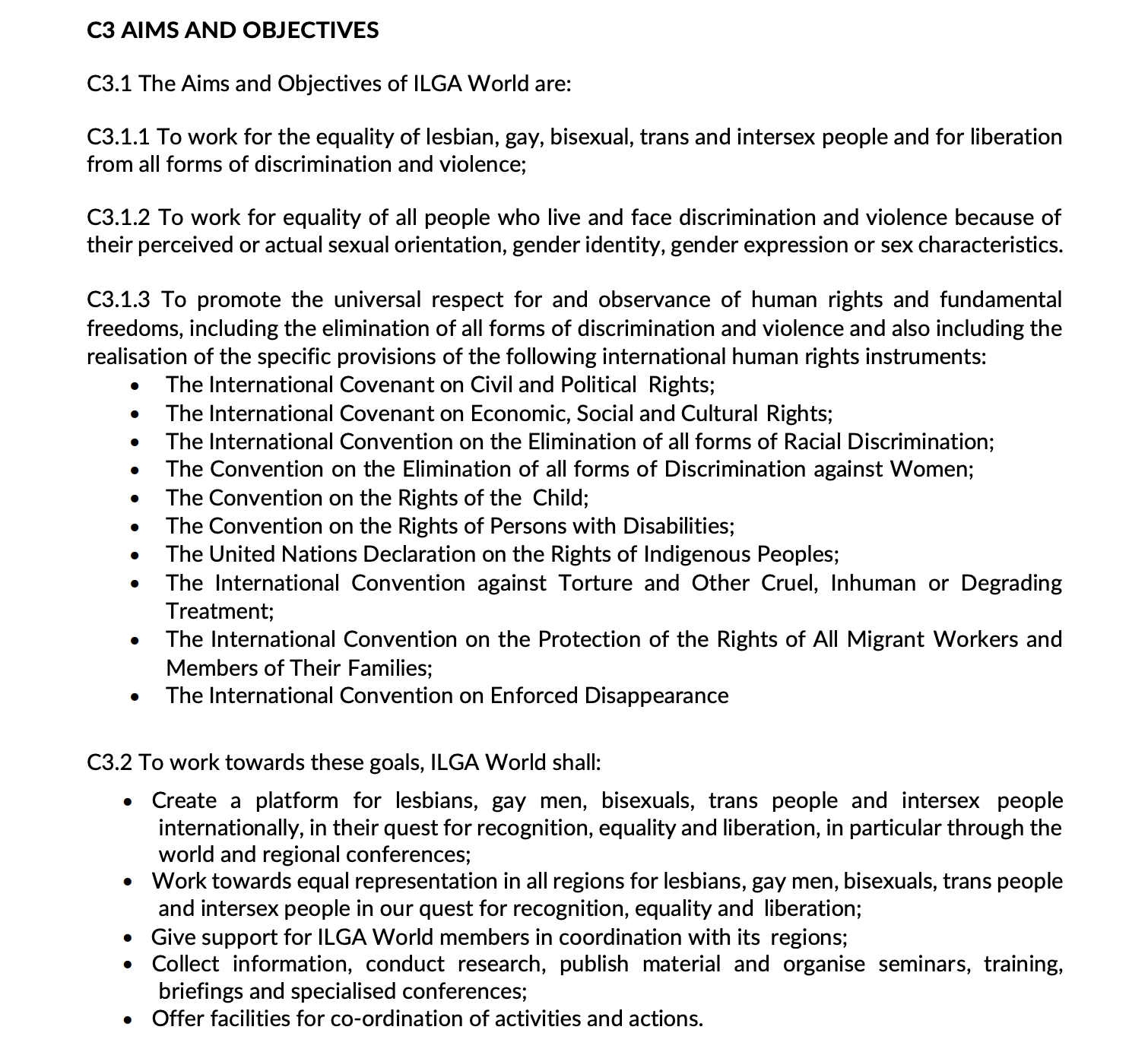
“The ILGA World board is also reviewing the Aguda’s compliance with our constitution and has decided to suspend the organization from our membership to allow for that to happen,” said ILGA World in its announcement.
The decision to suspend the Aguda comes against the backdrop of the war in the Gaza Strip.
Hamas militants last Oct. 7 killed roughly 1,200 people, including upwards of 360 partygoers at the Nova Music Festival, when they launched a surprise attack against southern Israel. The Israeli government says the militants also kidnapped more than 200 people.
The Hamas-controlled Gaza Health Ministry says Israeli forces have killed more than 41,000 people in the enclave since Oct. 7.
A case that South Africa filed with the International Court of Justice in the Hague late last year accuses Israel of committing genocide against Palestinians in Gaza.
The International Criminal Court, which is also in the Hague, in May announced it plans to issue arrest warrants for Israeli Prime Minister Netanyahu, Israeli Defense Minister Yoav Gallant, and three Hamas leaders — Yahya Sinwar, Mohammed Deif, and Ismail Haniyeh.
Karim Khan, the ICC’s chief prosecutor, said the five men have committed war crimes and crimes against humanity in Gaza and Israel. (A suspected Israeli airstrike on July 31 killed Haniyah while he was in the Iranian capital of Tehran to attend Iranian President Masoud Pezeshkian’s inauguration. Israeli soldiers on Oct. 16 killed Sinwar in Rafah, a city in southern Gaza that borders Egypt.)
“We know that seeing the Tel Aviv bid taken into consideration caused anger and harm to our communities,” said ILGA World in its statement. “Our apology goes to our members, to our host organizations, and our global communities — and especially to those in South Africa, who will soon host the global movement for our upcoming World Conference.”
“We recognize the historical experience with apartheid and colonialism in South Africa: Even the possibility of voting on such a bid in their home country would have been at odds with the unequivocal solidarity for the Palestinian people,” it adds.
ILGA World also said it supports calls for “stronger governance practices in vetting the proposals we receive.”
“We heard our communities, and we must do better in the future: A situation like this must not repeat,” it said.
The Aguda in a statement said it is “deeply disappointment that ILGA has chosen to boycott those who work for LGBTQ+ rights and strive towards a more just society.”
“For 50 years, the Aguda, the Association for LGBTQ+ Equality in Israel, has worked to support the LGBTQ+ community and uphold human rights for all, including supporting LGBTQ+ individuals in the Arab community, and Palestinian asylum seekers persecuted for their sexual and gender identities,” reads the statement. “The Israeli LGBTQ+ identity embraces both service and contribution to the state as citizens, while continuing to fight for the values of democracy and human rights in the society in which we live.”
The Aguda added Israel’s LGBTQ+ community “should not bear responsibility for government policy, and we expect the international community to support liberal voices rather than boycott them.”
“We are proud to be LGBTQ+ and Israeli, and we will continue to fight for a more equal and safer society,” said the Aguda.
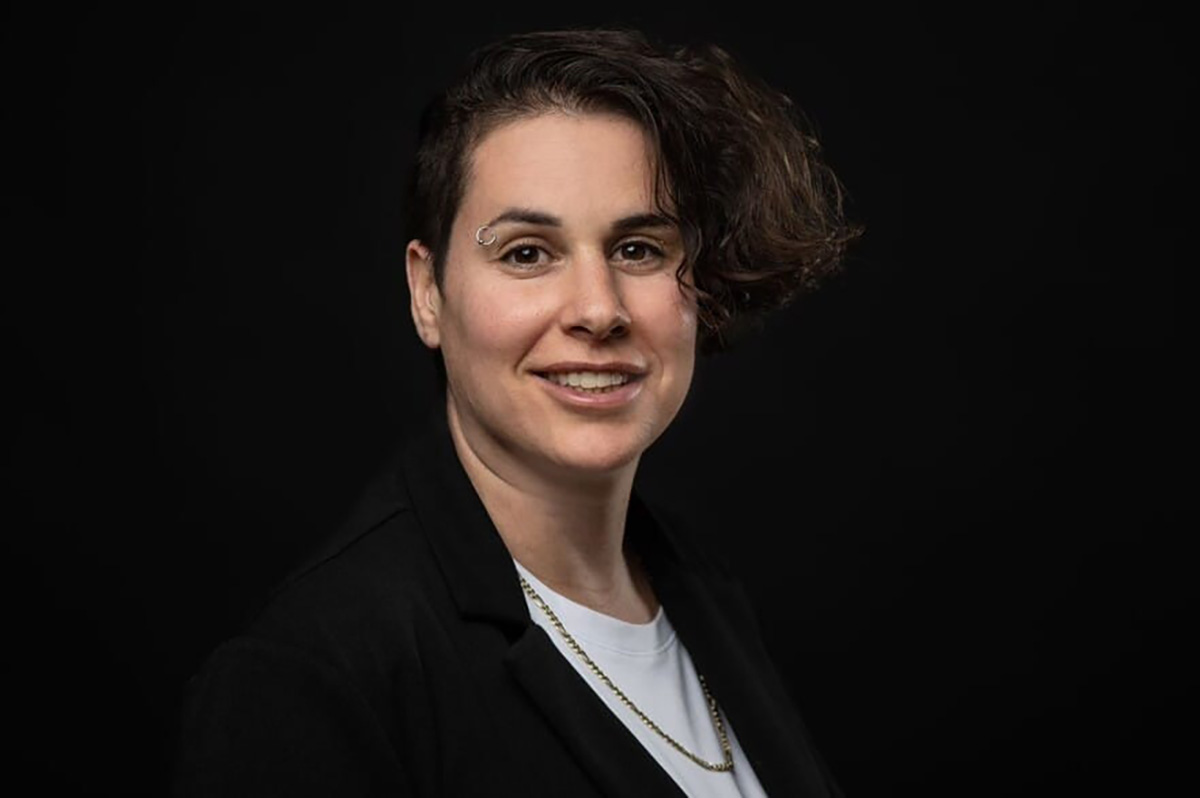
ILGA World Executive Director Julia Ehrt on Wednesday told the Washington Blade in an emailed statement the organization “has communicated in writing with the Aguda.”
“So far, we have not heard from them other than on social media, but of course they have a right to defend their membership status according to our governance procedures,” said Ehrt.
Groups ‘complicit in Israeli apartheid or genocide should be expelled’
Charbel Maydaa, the founder and general director of MOSAIC, a Lebanon-based advocacy group that works throughout the Middle East and North Africa, is also the co-chair of ILGA Asia. He is among the activists who welcomed ILGA World’s decision to withdraw the Aguda’s bid.
A thread in response to a post on Maydaa’s LinkedIn page notes ILGA World in 1987 expelled the Gay Association of South Africa after it “refused to condemn apartheid” in the country “or to get involved in political struggles.”
“GASA’s stance led to its dissolution, and the formation of new and more progressive LGBT rights groups in South Africa,” said Gabriel Hoosain Khan, a London-based activist. “Organizations that are complicit in Israeli apartheid or genocide should be expelled.”
The International Planned Parenthood Federation also welcomed ILGA World’s decision. A Wider Bridge, a group that “advocates for justice, counters LGBTQphobia, and fights antisemitism, and other forms of hatred,” described it as “outrageous and unacceptable.”
ILGA (International Lesbian, Gay, Bisexual, Trans and Intersex Association) supposedly stands for respect for human rights, equality and freedom regardless of sexual orientation, gender identity, gender expression or sex characteristics,” said A Wider Bridge in a statement. “But by singling out Israel and Israeli LGBTQ people for opprobrium, ILGA violates its fundamental principles.”
The 2022 ILGA World Conference took place in Long Beach, Calif.
“I am appalled and disgusted that ILGA World would ostracize and expel the leading organization in Israel that fights for the civil rights of LGBTQ+ people there,” said California Assemblymember Rick Chavez Zbur, who is the former executive director of Equality California, a statewide LGBTQ rights group, on X. “This is appalling and blatant anti-Semitism and an abandonment of LGBTQ+ Israelis.”
Shame on @ILGAWORLD. As the former leader of @eqca, CA’s LGBTQ civil rights org, I am appalled and disgusted that @ilgaworld would ostracize and expel the leading org in #Israel that fights for the civil rights of LGBTQ+ ppl there. This is appalling and blatant antisemitism and… https://t.co/6zrU1WQQ7J
— Rick Chavez Zbur (@RickChavezZbur) October 30, 2024
Ehrt in her statement to the Blade acknowledged criticisms over ILGA World’s decision. She also dismissed suggestions that anti-Semitism prompted it.
“ILGA World has a long and proven record of fighting for equality for all,” said Ehrt. “We have repeatedly called for peace in the region, and continue to work every day to counter racism, xenophobia, islamophobia, and anti-Semitism — alongside LGBTI-phobia. Our daily work speaks much louder than the baseless accusations we are receiving.”
Israel
LGBTQ Israelis struggle with Oct. 7 aftermath
Groups coordinating mental health services, donations for displaced families

Editor’s note: International News Editor Michael K. Lavers was on assignment in Israel from Oct. 4-14.
JERUSALEM — LGBTQ Israelis and the groups that advocate for their rights continue to struggle with the aftermath of Oct. 7.
Hadas Kerem Bloemendal is the chair of Jerusalem Open House for Pride and Tolerance, a group that organizes the city’s annual Pride parade. The therapist and former Israel Defense Forces intelligence officer who is raising twins with her wife spoke with the Washington Blade on Oct. 8 at Jerusalem Open House’s offices that are located near the city’s Zion Square.
Bloemendal said she and her colleagues in the days after Oct. 7 realized a lot of LGBTQ Israelis would not ask for help “from regular hotlines because they are afraid that the people that will answer will not be gay-friendly enough or will not understand the complexity of what they are going through.”
She told the Blade a closeted man in a message he posted to an online bulletin board said he is “really afraid because his boyfriend was kidnapped, and he can’t tell anyone because he’s gay and he’s not out, and if anyone would find out, what would they do to him.”
The man’s boyfriend is one of 251 people who Hamas militants kidnapped on Oct. 7. It remains unclear whether all of the 101 hostages who remain in the Gaza Strip are still alive.
“You can’t imagine such a thing,” said Bloemendal.
A group of gay-friendly therapists after Oct. 7 volunteered to hold virtual sessions for Jerusalem Open House. The group also created a Google spreadsheet to streamline referrals.
Bloemendal said Jerusalem Open House received more than 80 calls in the two weeks after Oct. 7.
The Jewish Federations of North America gave Jerusalem Open House funding to continue the program. Jerusalem Open House subsequently created a network of LGBTQ-friendly therapists and social workers throughout Israel who work with the transgender community, Orthodox men and women, Arab Israelis, and other groups.
“People who lost family members, people who are evacuated from their homes are getting therapy through the project,” said Bloemendal.
She added Jerusalem Open House also works with IDF reservists, “people who were hurt during this war,” and “people who were already in a very fragile state before the war started.”
“When you are a fragile population, war only makes it worse,” said Bloemendal.

Yam Bahar is a spokesperson for Pride House of Be’er Sheva in Be’er Sheva, which is southern Israel’s largest city. The freelance photographer and editor who also manages a local bar spoke with the Blade on Oct. 9.
A Bedouin man three days earlier killed an Israel Border Police officer and injured 10 others when he attacked Be’er Sheva’s main bus station. It is less than a mile from Pride House of Be’er Sheva.


Pride House of Be’er Sheva, like Jerusalem Open House, offered psychological support to the local community after Oct. 7. Pride House of Be’er Sheva also started a “hamal” or “war room” in Hebrew that coordinated donations of food and children’s toys to displaced families.
“It was important for the community here to do this,” Bahar told the Blade.
Pride House of Be’er Sheva also distributes food on holidays.
“We’re trying to make this a place that can address real problems of people who are here,” said Bahar.
The Aguda, the Association for LGBTQ Equality in Israel, after Oct. 7 worked with other advocacy groups to host displaced people. The Aguda also made care packages for IDF soldiers, and offered mental health services.
“We did our best,” Aguda CEO Yael Sinai Biblash told the Blade on Oct. 8. “LGBTQ people in Israel are vulnerable, and once we’re at war they are more vulnerable.”
“They need more help,” she added.
Hamas militants on Oct. 8, 2023, killed IDF Maj. Sagi Golan in Be’eri, a kibbutz that is near the Israel-Gaza border. His fiancé, Omer Ohana, with the support of the Aguda and other advocacy groups, successfully lobbied Israeli lawmakers to amend the country’s Bereaved Families Law to recognize LGBTQ widows and widowers of fallen servicemembers.
Biblash is among the hundreds of people who attended Golan’s memorial service that took place at a community in the Tel Aviv suburb of Herzliya on Oct. 8. Biblash spoke with the Blade after it ended.
“It was a big effort and a big success,” she said, referring to the campaign to change the Bereaved Families Law.
Oct. 7 has left LGBTQ Palestinians even more vulnerable, isolated
The activists with whom the Blade spoke readily acknowledged Oct. 7 and its aftermath have particularly harmed LGBTQ Palestinians.
Bloemendal noted Jerusalem Open House works with people from the West Bank, Israeli settlements, and Arab cities throughout the region.
“It’s about whether you can come here,” she said. “Once you come here, we don’t care where you come from.”
The Tel Aviv Court for Administrative Affairs in February ruled LGBTQ Palestinians can request asylum in Israel based on persecution they suffer in their homeland because of their sexual orientation or gender identity. Bloemendal noted the additional restrictions on travel from the West Bank that Israel implemented after Oct. 7 has left LGBTQ Palestinians even more vulnerable and isolated.
“Some of them could come and go before, but … everything is more closed now because they (Israeli authorities) are afraid of suicide bombs and things like that,” she said. “It’s much harder to leave home, so you don’t even have your one time a week getting out to Jerusalem and having your LGBTQ experience.”
Neesha Gagement of the Israeli Transgender Association, a group that works with Palestinian trans sex workers in Jaffa, spoke with the Blade on Oct. 13 at her office in Tel Aviv’s Neve Sha’anan neighborhood.
She said many of the sex workers with whom she and her colleagues work faced discrimination, harassment, and other challenges before Oct. 7 — and some chose “a very Israeli name” and did not “speak out” as a result. Gagement told the Blade that many of them are now afraid of leaving their homes, have stopped using social media, and even planning to leave Israel.
“[They are] terrified of expressing their opinion,” she said.
The Israeli Transgender Association since Oct. 7 has offered virtual psychological services. Therapists in some cases will also meet clients at coffee shops close to where they live.

The Israeli government says Hamas militants on Oct. 7 killed roughly 1,200 people, including upwards of 360 partygoers at the Nova Music Festival near Re’im, a kibbutz that is a few miles southwest of Be’eri. The Hamas-controlled Gaza Health Ministry says Israeli forces have killed more than 42,000 people in the enclave since Oct. 7.
The International Criminal Court in May announced it plans to issue arrest warrants for Israeli Prime Minister Benjamin Netanyahu, Israeli Defense Minister Yoav Gallant, and three Hamas leaders — Yahya Sinwar, Mohammed Deif, and Ismail Haniyeh.
Karim Khan, the ICC’s chief prosecutor, said the five men have committed war crimes and crimes against humanity in Gaza and Israel. (A suspected Israeli airstrike on July 31 killed Haniyah while he was in the Iranian capital of Tehran to attend Iranian President Masoud Pezeshkian’s inauguration. IDF soldiers on Oct. 16 killed Sinwar in Rafah, a city in southern Gaza that borders Egypt.)
Hamas, which the U.S. and Israel have designated a terrorist organization, claimed responsibility for an Oct. 1 attack at a light rail station in Jaffa that left seven people dead and more than a dozen others injured.
Hezbollah, an Iran-backed militant group the U.S. and Israel have designated a terrorist organization, since Oct. 8, 2023, has been regularly launching rockets and missiles from Lebanon to Israel.
The Lebanese Health Ministry has said Israeli airstrikes in Beirut and elsewhere in the country in recent weeks have killed upwards of 2,500 people.
An Israeli airstrike in the Beirut suburb of Dahieh on Sept. 27 killed long-time Hezbollah Secretary-General Hassan Nasrallah. Iran on Oct. 1 launched upwards of 200 ballistic missiles at Israel in retaliation.
Hamas on the anniversary of Oct. 7 launched rockets that triggered sirens in Tel Aviv and surrounding areas. The Houthi rebels in Yemen on the same day launched missiles and drones that prompted additional warnings in central Israel. Hezbollah missiles on the anniversary of Oct. 7 also targeted an IDF base north of Tel Aviv.
Israel’s air defense system intercepted almost all of the rockets and missiles.
Hamas militants kidnapped, murdered Yad Vashem historian
Oct. 7 and the war has directly impacted several of the activists with whom the Blade spoke.
Hamas militants kidnapped Alex Dancyg, a historian at Yad Vashem, Israel’s Holocaust memorial, from his home in Nir Oz, a kibbutz that is roughly two miles from Khan Younis, a city in southern Gaza.
The militants later killed Dancyg, and the IDF on Aug. 20 recovered his body from a tunnel in Khan Younis. His wife and young twins spent upwards of 18 hours trapped in Nir Oz on Oct. 7 before the IDF rescued them.
Bloemendal became friends with Dancyg when she worked at Yad Vashem. She became emotional when she spoke about him.
“I learned a lot from him,” said Bloemendal. “We became friends.”
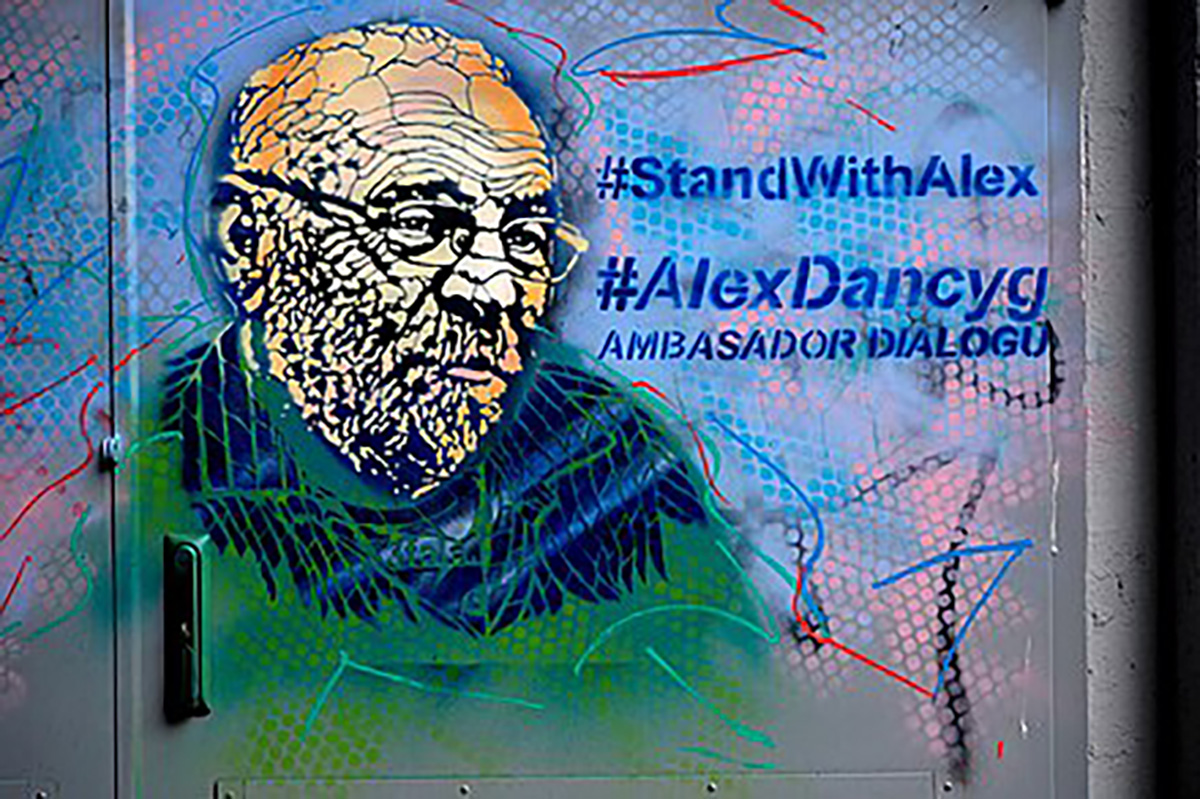
Bloemendal’s brother is an IDF reservist who fought Hamas militants in Gaza. His wife and their three young children left their home in Kiryat Gat, a city in southern Israel that is roughly 20 miles east of Gaza, and lived with Bloemendal’s parents and other relatives in Jerusalem for several months.
“We try to help as best as we can, but she has three kids under the age of five,” said Bloemendal. “No matter how much you help it’s not the same.”
Hezbollah rocket killed three of gay Druze man’s cousins
Ala Ibrahim, 30, is a gay Druze man who grew up Majdal Shams, a predominantly Druze community in the Golan Heights. He moved to Tel Aviv a decade ago, and works in the city’s high tech industry.
Ibrahim on July 27 was about to board a flight to Israel from Bangkok when his mother called him and told him a Hezbollah rocket had struck a soccer field in Majdal Shams.
He told the Blade on Oct. 14 during a telephone interview that he knew the rocket had killed nine children when the flight took off. Ibrahim landed at Ben-Gurion Airport 10 hours later, and heard a reporter read the names of the 12 victims on the radio while he was in a taxi.
Three of them — Johnny Wadeea Ibrahim, Guevara Ibrahim Ibrahim, and Alma Ayman Fakhr al-Din — were his cousins.
“That’s how I knew,” said Ibrahim.
He quickly returned to Majdal Shams with his cousin.
Ibrahim said the victims’ caskets were not open at their funerals “because all of them were not in a state where they could be shown.” He told the Blade that children were crying because they could no longer play with their friends.
“It was a heartbreaking day to be there,” said Ibrahim.
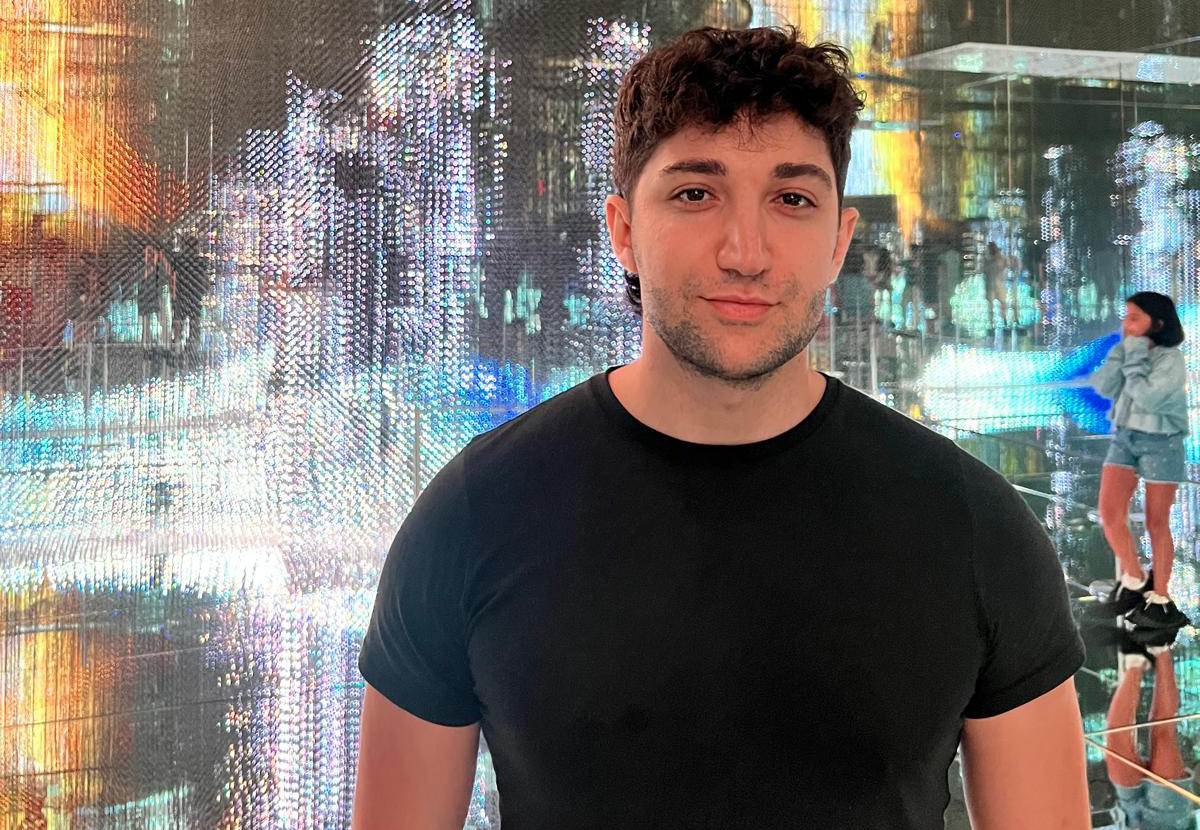
The Nova Music Festival was less than 30 miles from Be’er Sheba.
Former Pride House of Be’er Sheva Chair Ariella Menaker told the Blade less than a week after Oct. 7 that she received an invitation to attend one of the festival’s parties. She said she knew at least five people who had been killed.
“It’s a close-knit group,” said Menaker. “Even people you don’t know by name; you’ve partied with them; you know them. You’ve known them for years from the dance floor.”
“I keep thinking about them, trying to escape,” she added.
Bahar said “everyone knows someone” who was killed on Oct. 7.
“We can’t see the end right now,” Biblash told the Blade after Golan’s memorial service.
She lives outside of Tel Aviv with her 1-year-old child.
Biblash described the Iranian missile attack against Israel on Oct. 1 as “terrifying.” She also said her child sleeps in her home’s safe room.
“That’s crazy,” said Biblash. “That should not happen.”
Israel
Murdered Israeli hostage’s cousin describes family’s pain
Carmel Gat killed in the Gaza Strip in late August

TEL AVIV, Israel — Carmel Gat on Oct. 6, 2023, traveled to Be’eri, a kibbutz near the border of Israel and the Gaza Strip where she grew up, to celebrate the Jewish holiday of Simchat Torah with her parents, brothers, and extended family.
Gat and her brother, Alon Gat, planned to go for a run at around 6:30 a.m. the next morning.
“At 6:29, the bombing and the alarms started and the whole family went into the safe room,” her cousin, Shay Dickmann, told the Washington Blade on Monday. “We have this last picture of Carmel with her running clothes on, in which she was later kidnapped, reading a book to Geffen (her young niece.)”
“It is just typically Carmel in this moment of distress when there are rockets around, the rumors start running that there are terrorists inside the kibbutz, she just had the inner power and stability to take care of others and help her niece, her 3 and 1/2 year old niece, try and calm her down,” said Dickmann.
Dickmann said Gat’s mother, Kinneret Gat, left the safe room at about 10:30 a.m. to get some food and water. Her father, Eshel Gat, went to the bathroom.
Dickmann said Kinneret Gat saw Hamas militants from her kitchen window.
“The last thing she managed to do was to warn her husband, Eshel, from the terrorists and shush him with her finger on her lips and she signaled him to go back to the toilet and hide himself,” recalled Dickmann. “She didn’t know at that point she saved his life.”
Dickmann said the bathroom in which Eshel Gat was hiding was the one room in the house the militants did not search.
“He was safe, but from the window of the toilet he saw his family taken one-by-one by the terrorists,” Dickmann told the Blade.
She said the last time Eshel Gat saw his wife she was bending down in the kitchen, “and she was the first to be taken by the terrorists.”
“They came into the kitchen, and they took her,” she said. “They tied her hands and walked her through her own kibbutz barefoot with a bunch of people from Kibbutz Be’eri.”
The militants then put Carmel Gat in a car with two teenagers who were brother and sister.
“The car was moving, driving through the point where Carmel saw her mother lying down on the sidewalk, her head shot and she realized that she saw her mother dead and this is the last thing that Carmel saw when she was taken hostage into Gaza, her beloved one dead,” said Dickmann.
She said her cousin did not know what happened to the rest of her family: Her father, her two brothers, her sister-in-law, Yarden Roman-Gat, and her niece Geffen. Her younger brother, Or Gat, had already left the kibbutz.
The Blade has previously reported the militants placed Roman-Gat, Alon Gat, and their daughter into a car.
Roman-Gat and Alon Gat jumped out of it with their daughter as it approached Gaza. Roman-Gat handed her daughter to her husband because he was able to run faster.
Alon Gat hid with his daughter for 18 hours before they reached Israel Defense Forces soldiers at Be’eri. He told Gili Roman, his brother-in-law who lives in Tel Aviv and is a member of the Nemos LGBTQ+ Swimming Club, he last saw his wife, Roman’s sister, hiding behind a tree to protect herself from the militants who were shooting at her.
“My brother saw a video on Telegram of Kinneret lying down on the sidewalk with a pool of blood next to her head, said Dickmann, recounting how she and her family learned the militants had murdered Kinneret Gat.
“We started looking for Carmel and for Yarden and for 50 days we didn’t know anything about them,” added Dickmann. “Just imagine we were worried sick and not even knowing if their body might be found here or were they kidnapped alive.”
Hamas on the second day of a week-long ceasefire in November released the two teenagers who had been kidnapped alongside Carmel Gat.
“It was amazing to see how 13 children and women are coming back to us and their families, and they were among them,” said Dickmann. “Unfortunately they discovered that their mother was murdered and at the time they were informed that their father was kidnapped. Today we know that their father was murdered as well. They are orphans.”
The teenagers confirmed that Carmel Gat was alive.
“Carmel was with them since the moment that they were put into the car taking them into Gaza and until the moment they were released and they say she was their guardian angel,” Dickmann told the Blade. “She was just keeping them sane in captivity, supporting them. She was handling a diary, writing down songs and sentences to bring their spirits up and she was practicing yoga with them in captivity.”
“This was the most amazing thing that we learned, just having that inner power in this situation. We know that they were starved. We know that they experienced violence there, that they were held in an apartment, in a baby’s room, having to lay on the floor, given one pita bread a day they had to share, and being held against their will, far from their families, not knowing if they are alive or not, but she had the powers to give to others and knowing that Carmel is there, being Carmel, choosing to live, it gave so much hope, and to this hope we were holding on, day-by-day, in the hope that the next day she would be on the list of people realized.”
Hamas on Nov. 29, 2023, released Roman-Gat, along with 11 other Israelis and four Thai nationals. She reunited with her family a short-time later at an Israeli hospital.
“On the fourth day Yarden came back,” said Dickmann. “I can’t even describe the feeling.”
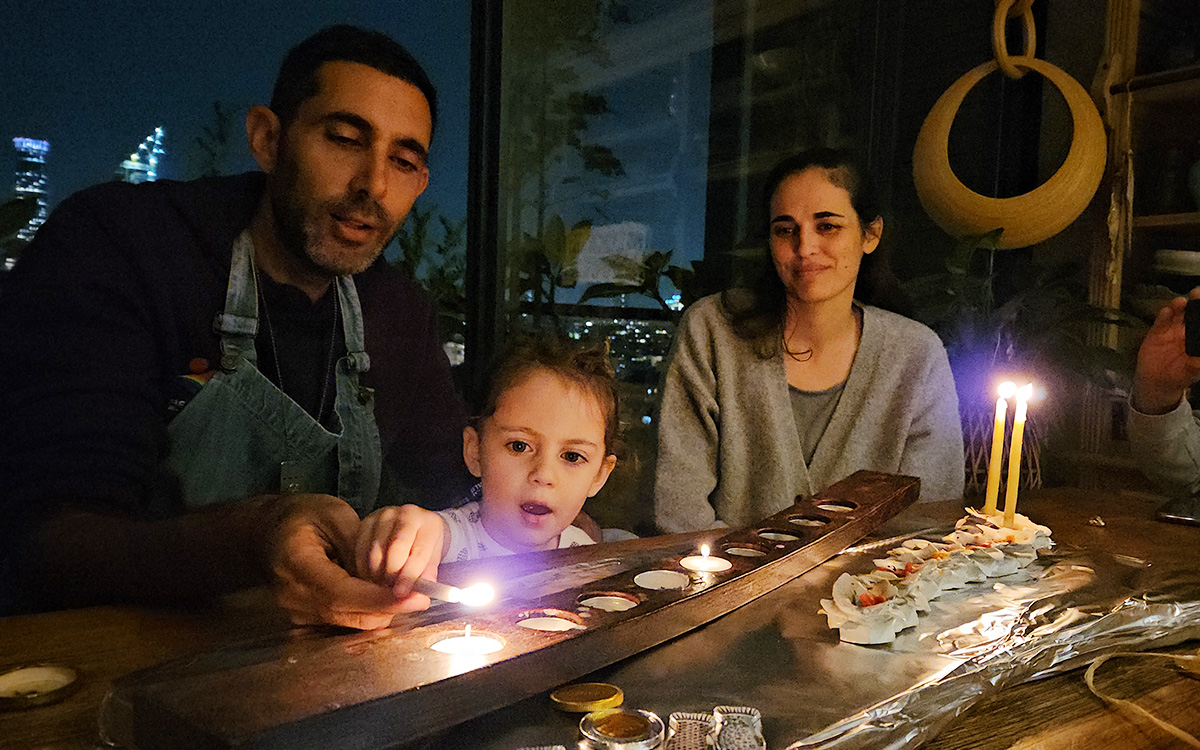
Hamas was supposed to release Carmel Gat on the eighth day of the ceasefire, but it only lasted seven days.
“Carmel was supposed to be freed on the eighth (day), and she wasn’t, and she was left behind,” Dickmann said. “For us it was devastating, but we also knew that Carmel is holding on to hope, and we were holding on to her hope and we did it in her way.”
Carmel Gat’s family every Friday practiced yoga, “inspired by her, and giving power to others.” They invited other hostage families to speak about a loved one who was in Gaza.
“We did it for weeks, week after week, 40 weeks, that we spoke about the hope, that we were holding the hope, that she was surviving there, waiting for this moment, for the deal that will free her,” said Dickmann.
The Israeli government on Sept. 1 announced Hamas had killed Carmel Gat and five other hostages — Hersh Goldberg-Polin, Ori Danino, Alexander Lobanov, Almog Sarusi, and Eden Yerushalmi — in a tunnel beneath Rafah, a city in southern Gaza that borders Egypt. The hostages “were shot at close range” by militants on Aug. 29 or Aug. 30 before the IDF could rescue them.
“Carmel survived for 328 days,” Dickmann told the Blade. “She survived, until the day that she was brutally executed by her captors. She survived everything. She survived the tunnels.”
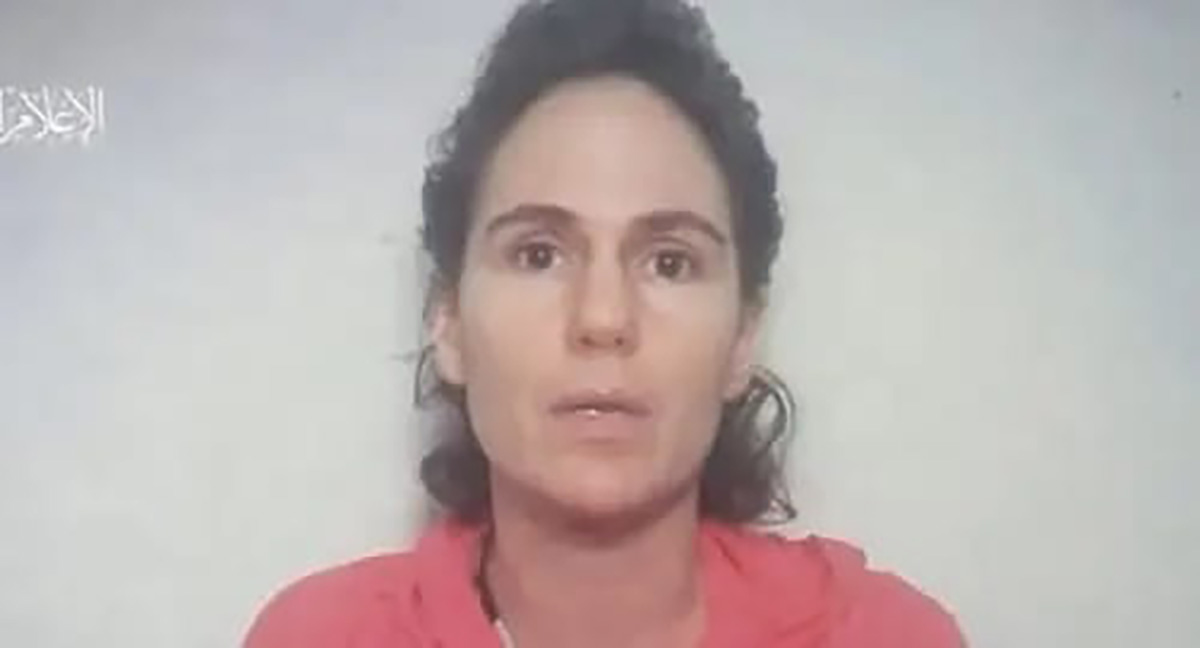
Dickmann said she and her family received a video that showed where the militants killed Carmel Gat and the five other hostages.
“The conditions were horrible,” said Dickmann. “They were 20 meters underground, suffocating, moist. It was moldy. They had very little food. The six bodies were found thin and starved.”
The video also showed bottles filled with urine and blood alongside the tunnels. Dickmann said the bodies also showed signs they had been tied up.
“She survived it all, but she couldn’t survive the bullet in her head, and her life was finished in a tunnel, shot, 328 days from her mother’s same destiny, but Carmel we could save, for 328 days we could save her,” said Dickmann. “We could have made a deal that could have brought her back home alive.”
Dickmann also told the Blade she “could also imagine” her cousin, who was an occupational therapist, helping Goldberg-Polin, who lost part of his arm when militants attacked him after he fled the Nova Music Festival in Re’im, another kibbutz that is near Gaza. She was also “imaging her having conversations” with Lobanov about what to name his second son to whom his wife had given birth while he was in Gaza.
“She believed in the possibility to live here with our neighbors,” said Dickmann, who added her cousin and Kinneret Gat were also studying Arabic.
“There are so many people still alive there surviving, waiting for us to make the deal that will save them,” she said. “There are so many families who can still get this hug, the hug that I was waiting for and I’ll never get.”
Hamas, Hezbollah, Houthis launch rockets, missiles towards Israel on Oct. 7 anniversary
The Blade spoke with Dickmann hours after she and her family attended the Bereaved Families Memorial Ceremony in Tel Aviv’s Yarkon Park that marked a year since Oct. 7.
Organizers had originally allocated 40,000 free tickets for the event, but only 2,000 family members and reporters attended because the IDF Home Front Command had limited the number of people who could attend large gatherings because of increased threats of rockets and missiles from Hamas and Hezbollah, a Lebanon-based militant group.
A ballistic missile that Houthi rebels in Yemen launched towards Israel prompted sirens to go off in Tel Aviv and surrounding areas, but the country’s air defense system intercepted, less than hour before the event began.
Hezbollah a few hours later launched five ballistic missiles from Lebanon towards an IDF base north of Tel Aviv. The Iron Dome air defense system intercepted them. It also intercepted four of the five rockets that Hamas launched towards Tel Aviv — shrapnel from one of them that struck the ground slightly injured two women.
Or Gat is among those who spoke at the Bereaved Families Memorial Ceremony.
Many of the hostage families refused to attend a government-organized memorial that Israeli televisions broadcast later on Monday.

Cousin was a ‘person of peace’
Dickmann told the Blade that while she was at the memorial she was “very concentrated on the struggle to bring back the hostages on time, understanding that it’s both critical in the manner that is life or death matter and it is also urgent, understanding that our people are held by their captors who at any time aim a gun at their heads.”
“They must be returned before they’re executed so, I was very concentrated on that,” she said.
Dickmann also said the memorial — and marking the first anniversary of Oct. 7 — made her “understand there are thousands of families affected by Oct. 7.”
“On this day, so many youngsters were burned alive in their cars trying to run away from the Nova festival,” she said. “In the safe rooms there were so many couples of parents hiding their children in closets and underneath beds and shushing them in order to allow them to survive the attack on their houses and today I just realize there are … so many orphans left and so many stories of people who left everything behind, who left their whole families behind to come and try to save lives on this day of the attack. Some of them managed and rescued my uncle and some of them managed to save lives and lost their own.”
She also noted 101 hostages remain in Gaza.
“This is the most important thing and most urgent thing; to get back all of them to their houses and their families,” said Dickmann. “They deserve to be set free, and this is what I’m fighting for.”
She ended the interview by describing her cousin as a “person of peace.”
“We lost so much, on both sides of the border,” said Dickmann. “I’d really like this war to end; everybody to come back to their homes; the Palestinians to their homes with no one else getting hurt; residents of northern Israel going back to their houses and being safe and secure, residents of the South being able to go back to their houses and most of all the people being held hostage to come back, to safety, to their house, to their families and not ever being having to be worried about whether they will be separated from their parents or children or brothers and lives again.”
“I really hope that soon, as soon as possible, we will be able to reach a deal that will bring everybody home and bring peace upon us and we will be able to live alongside each other in peace,” she added.
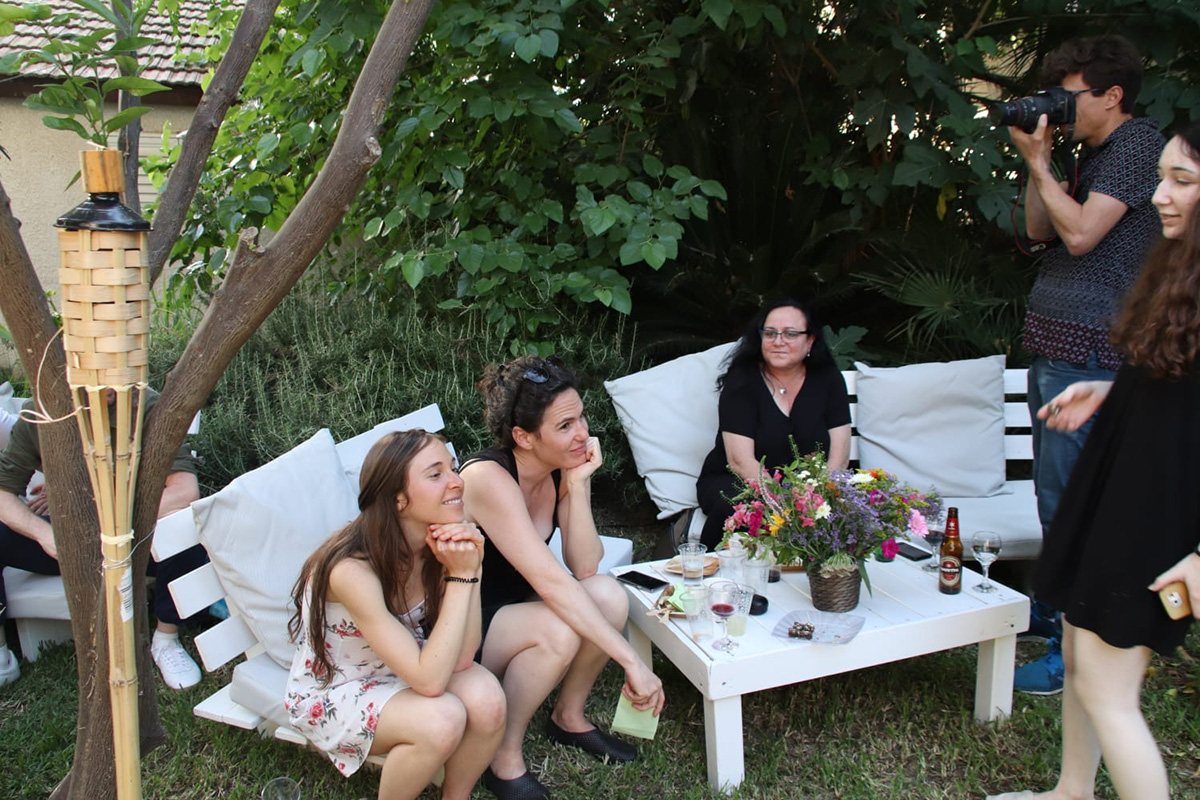

TEL AVIV, Israel — I was sound asleep at 11 p.m. (4 p.m. ET) on Monday when Tzofar, an app that notifies users of incoming rockets, started to go off. The blaring alarm woke me up. It indicated a “red alert” for “incoming (missiles and rocket fire.)”
I sat up in bed, opened the app to see whether I was under “red alert.” I was just south of it, so I did not need to seek refuge in the stairwell, which is the building’s designated safe room. Less than a minute later I heard a series of loud booms that shook the building.
Hezbollah launched five ballistic missiles from Lebanon towards an Israel Defense Forces base north of Tel Aviv. The explosions that I heard were Israel’s Iron Dome air defense system intercepting them.
The whole situation was over in less than two minutes — it was the third “red alert” for “incoming (missiles and rocket fire)” that I received on my phone on Monday, which was a year since Hamas launched its surprise attack against southern Israel.

Hamas at around 11 a.m. (4 a.m. ET) launched five rockets that triggered alerts in southern Tel Aviv. Iron Dome intercepted four of them. Shrapnel from the rocket that hit the ground left two women slightly injured. I heard the interceptions in the distance. I walked onto my balcony a couple of minutes later, and saw a man hugging a young woman who was standing on her balcony across the street. She was clearly upset.
I walked to a nearby coffee shop about half an hour later, and ordered an iced coffee. I walked back to my building and started working again. I called my mother a short time later to let her know that everything was fine. I also sent several text messages to my husband and other loved ones and friends that reiterated that point.

The Houthis in Yemen launched a ballistic missile towards Israel shortly after 5:30 p.m. (10:30 a.m. ET) that the IDF intercepted. I was in Hostage Square outside the Tel Aviv Museum of Art when I heard warning messages on people’s phones. I looked at the Tzofar app, and saw Hostage Square was outside of the “red alert” area. I then logged onto two Israeli media outlets’ — the Times of Israel and Haaretz — websites that I have bookmarked on my phone and read the IDF had intercepted the Houthi missile.
More than a thousand people were gathered in Hostage Square less than 90 minutes later, watching an Oct. 7 memorial concert on a large screen that had been set up. The IDF Home Front Command has limited the number of people who can gather in one place in Tel Aviv because of the continued threats of rocket and missile attacks from Gaza and Lebanon.
This limit is 2,000.

The sounds of war have been a constant backdrop of this trip.
I begin every day with a swim in the Mediterranean Sea at Hilton Beach, which is Tel Aviv’s gay beach. These swims help me stay somewhat sane while I am here in Israel.
Israeli fighter jets and helicopters with missiles strapped to them regularly fly north along the coast towards Lebanon. Drones can also be heard. This scene plays out against the context of people swimming, kayaking, and paddleboarding in the water, and others walking and jogging on the nearby beach promenade.

The Nova Music Festival site where Hamas militants killed 360 people and took 40 others hostage on Oct. 7 is located outside of Re’im, a kibbutz that is roughly two miles from the Gaza Strip. It is about an hour and 20 minutes south of Tel Aviv.
I visited the site on Oct. 5.
Large IDF Home Front Command banners warn visitors they had 15 seconds to reach makeshift shelters — large concrete barriers placed together — in case of incoming rockets.
“If you receive an alert, lie on the ground and protect your head with your hands for 10 minutes,” the banner reads.

There were no alerts while I was at Nova. I did, however, hear several Israeli airstrikes in Gaza.
I stopped at a roadside restaurant in Yad Mordechai, a kibbutz that is roughly three miles north of the Erez crossing between Israel and Gaza, after I left Nova. I had a sandwich for lunch and ordered an ice coffee for the drive back to Tel Aviv. I was walking to my car and I heard two distant Israeli airstrikes in Gaza. The second one shook the ground beneath my feet.
I was back in Tel Aviv less than an hour later. It was the last day of Rosh Hashanah, and Shabbat. Hilton Beach, where I had taken my morning swim earlier in the day, was packed.
Life, at least for Israelis who live in Tel Aviv, goes on amid the sounds of war.
Israel
Hundreds attend gay IDF soldier’s memorial service
Survivor benefits law changed after Sagi Golan’s death on Oct. 7

Editor’s note: International News Editor Michael K. Lavers will be on assignment in Israel through Oct. 14.
HERZLIYA, Israel — Hundreds of people on Tuesday attended a memorial service for a gay Israel Defense Force major who was killed while fighting Hamas militants in southern Israel on Oct. 7, 2023.
Sagi Golan, 30, was at home in the Tel Aviv suburb of Herzliya with his fiancé, Omer Ohana, when the militant group launched its surprise attack against from the Gaza Strip.
Ohana told the Washington Blade during an interview after the memorial service that Golan woke him up at around 6:30 a.m. after rocket sirens began to sound.
“We ran to the shelter in our house,” he said. “After that we just opened the news and the headline was ‘Hamas terrorist attack in Israel.'”
Ohana said people in the Israeli communities around Gaza were “begging for help.” Golan started to pack his IDF uniforms, and Ohana made him coffee.
“10 minutes later we were already at the doorstep kissing goodbye,” Ohana recalled. “That was the last time I saw him.”
“I told him not to be a hero,” he said. “He gave me a kiss, he told me we’re getting married in a week, don’t be silly.”
Golan deployed to Be’eri, a kibbutz that is near the border between Israel and Gaza.
He sent Ohana a heart emoji message to him via WhatsApp every hour “just to reassure he’s there.” Golan sent his last message to his fiancé and “to anyone” at 12:18 a.m. on Oct. 8, 2023.
Ohana told the Blade the next three days were “unbearable suffering, searching for Sagi under every rock in Israel, at every hospital emergency room, at every ‘hamal’ (IDF war room.)”
“We went everywhere, we did everything we could to find him,” said Ohana.
An IDF officer three days later “knocked on our door” to notify Sagi’s family that he had been killed. The officer did not speak with Ohana because the IDF did not recognize him as Sagi’s partner.
(The couple had planned to marry — virtually — in Utah on Oct. 14. Israel recognizes same-sex marriages that are legally performed abroad. The couple’s marriage celebration was to have taken place on Oct. 20.)
“I asked for something, and they said I had to request his parents,” Ohana told the Times of Israel. “It made me so angry. I was the one who loved him. But I’m not taken into account. And he wasn’t taken into account.”
The Israeli government says Hamas militants killed roughly 1,200 people, including upwards of 360 partygoers at the Nova Music Festival near Re’im, a kibbutz that is a few miles southwest of Be’eri. The Israeli government says the militants also kidnapped more than 200 people on Oct. 7.

The Hamas-controlled Gaza Health Ministry says Israeli forces have killed more than 41,000 people in the enclave since Oct. 7.
The International Criminal Court in May announced it plans to issue arrest warrants for Israeli Prime Minister Netanyahu, Israeli Defense Minister Yoav Gallant, and three Hamas leaders — Yehya Sinwar, Mohammed Deif, and Ismail Haniyeh.
Karim Khan, the ICC’s chief prosecutor, said the five men have committed war crimes and crimes against humanity in Gaza and Israel. (A suspected Israeli airstrike on July 31 killed Haniyah while he was in the Iranian capital of Tehran to attend Iranian President Masoud Pezeshkian’s inauguration.)
Hamas, which the U.S. and Israel have designated a terrorist organization, claimed responsibility for an Oct. 1 attack at a Tel Aviv light rail station that left seven people dead and more than a dozen others injured. A Bedouin man on Sunday killed an Israel Border Police officer and injured 10 others when he attacked a bus station in Beersheva in southern Israel.
Reuters on Friday reported the Lebanese Health Ministry said Israeli airstrikes in Beirut and elsewhere in the country over the last two weeks have killed more than 2,000 people.
Iran on Oct. 1 launched upwards of 200 ballistic missiles at Israel in response to an Israeli airstrike in the Lebanese capital a few days earlier killed Hassan Nasrallah, the long-time leader of Hezbollah, an Iran-backed militant group.
Hamas and Hezbollah on Monday launched fired rockets that triggered sirens in Tel Aviv and surrounding areas. The Houthi rebels in Yemen on Oct. 7 also launched missiles and drones that prompted additional warnings in central Israel.
Israel’s air defense system intercepted almost all of the rockets.
This reporter heard two of the interceptions — the first at around 11 a.m. Israel time (4 a.m. ET) and the second at around 11 p.m. Israel time (4 p.m. ET). The second interception shook the building in which this reporter has been staying.
Ohana was building a bench for children in a garden that Golan planted in Bat Yam, a city that is just south of Tel Aviv, when the first sirens went off.
‘If we are equal in death, we should be equal in life too’
Ohana, with the support of the Aguda, the Association for LGBTQ Equality in Israel, and other Israeli advocacy groups began to lobby the Knesset to amend the country’s Bereaved Families Law to recognize LGBTQ widows and widowers of fallen servicemembers. Lawmakers last November approved the changes.
“Sagi became a symbol for the LGBTQ+ community in Israel,” Ohana told the Blade. “With Sagi as a symbol, we were able to pass the amendment in the Israeli Knesset.”
“It wasn’t me,” he added. “I couldn’t have done it if Sagi wasn’t becoming a symbol. Having a gay hero in Israel is something new, something new for the community here.”
Aguda Chair Yael Sinai Biblash was among those who attended Golan’s memorial service.
She described the campaign to change the Bereaved Families Law as “a big effort, and a big success.”
“I hope that people understand that if we are equal in death we should be equal in life too,” said Sinai.
Gay Israeli pop star performs at Golan’s funeral
Golan had written his wedding vows on his phone.
Ohana told the Blade that his fiancé at 11:44 p.m. on Oct. 7 opened the memo on which they were written, and read them. Golan was shot less than 90 minutes later.
“I imagine Sagi having a notification that the event is about to be completed, because it was 10 until midnight for a whole day at the seventh of October, and just having a moment with himself, remembering love, having a good thought right before he died.” he said. “Knowing Sagi thought those happy thoughts just an hour before he died, saving Israeli citizens from this terror attack is filling me with pride in Sagi. That’s why he became a symbol. That’s why he’s a gay symbol.
Ivri Lider, a gay Israeli pop star, was to have performed at the couple’s wedding celebration. He instead performed at Golan’s funeral.
סרן במיל׳ שגיא גולן ז״ל שנפל בעת קרב בקיבוץ בארי נגד מחבלי החמאס, היה מיועד להתחתן עם בן זוגו עומר בעוד שבוע לצלילי השיר ״זכיתי לאהוב״. הערב הזמר עברי לידר הגיע לבצע את השיר בהלוויתו. שגיא ירד ביום שבת, מבלי לחכות לקריאה לקיבוץ בארי כדי להציל חיים ומשפחות נצורות. pic.twitter.com/epOVTVCMnY
— האגודה למען הלהט"ב בישראל | The Aguda (@AgudaIsraelLGBT) October 12, 2023
“[Sagi] was very special,” said Ohana. “He was very special to all of us.”
Middle East
‘I don’t want a genocide to be done on queer people’s behalf’
LGBTQ Palestinians speak about Oct. 7, war in Gaza

Editor’s note: International News Editor Michael K. Lavers will be on assignment in Israel through Oct. 9. Meta also removed this article from Lavers’s Facebook pages shortly after he published it.
Two LGBTQ Palestinians who spoke with the Washington Blade last week condemned Hamas’s surprise attack against southern Israel on Oct. 7, 2023. They also expressed condemnation of the subsequent war in the Gaza Strip, and the Israeli government’s policies towards the Palestinians.
Zaheer Subeaux is a queer Palestinian producer, DJ, emcee, and community organizer who lives in California. He is originally from Deir Dibwan, a small city on the West Bank that is a couple miles east of Ramallah, the Palestinian capital.
“Nothing justifies Oct. 7,” Subeaux told the Blade during a Sept. 30 telephone interview. He added the “international community, I think specifically the United States, has this perception that Oct. 7 is this new thing.”
“There’s a very short-lived memory for the American public, and there’s this concept that Palestinians are just creating more trouble,” said Subeaux.
He told the Blade that Jewish settlers before Oct. 7 shot his nephew “just for being on (their) land.” Subeaux said the situation on the West Bank “have been getting worse and worse and worse, and have continued to get worse and worse and worse up until this point, up until October of last year.”
“For a lot of Palestinians who have family back home, this seemed like a proportionate response to an oppressed people,” he said. “For everyone else who’s not paying attention, who allow their tax dollars to continue fund this genocide, for them it’s like, oh, shocking, oh, wow, right out of the blue, because they’re not paying attention to what’s happening.”
“For the rest of us who actually are, this seemed like a completely reasonable thing for a people to feel during a time like this,” added Subeaux. “I don’t think a lot of people have the context for that.”
Hannah Moushabeck is a queer, second-generation Palestinian American who lives in Massachusetts.
Her family is from West Jerusalem. Moushabeck has relatives in Ramallah and in Beirut, the Lebanese capital, and has friends in Gaza with whom she has “been in daily communication.”
“My immediate reactions on Oct. 7 were obviously horror and fear of what’s to come and the violence that happened that day,” she told the Blade on Sept. 30 during a telephone interview.
Moushabeck said it is “not unusual for Palestinians in the diaspora to experience some of this violence happening in our homeland.”
“This is honestly something that’s been going on since well before I was born,” she said. “So, growing up, whenever my parents seemed upset or, Palestinians were being shown in the news, I knew it was likely because they were being killed or involved with some kind of intense violence.”
Moushabeck said “a lot of Palestinians kind of had an instinct to go through the motions when Oct. 7 happened.”
“We also recognized that it was really unprecedented, and that the reaction and the revenge that the Israeli government took out on Palestinians would be like nothing we’ve ever seen before,” she added.
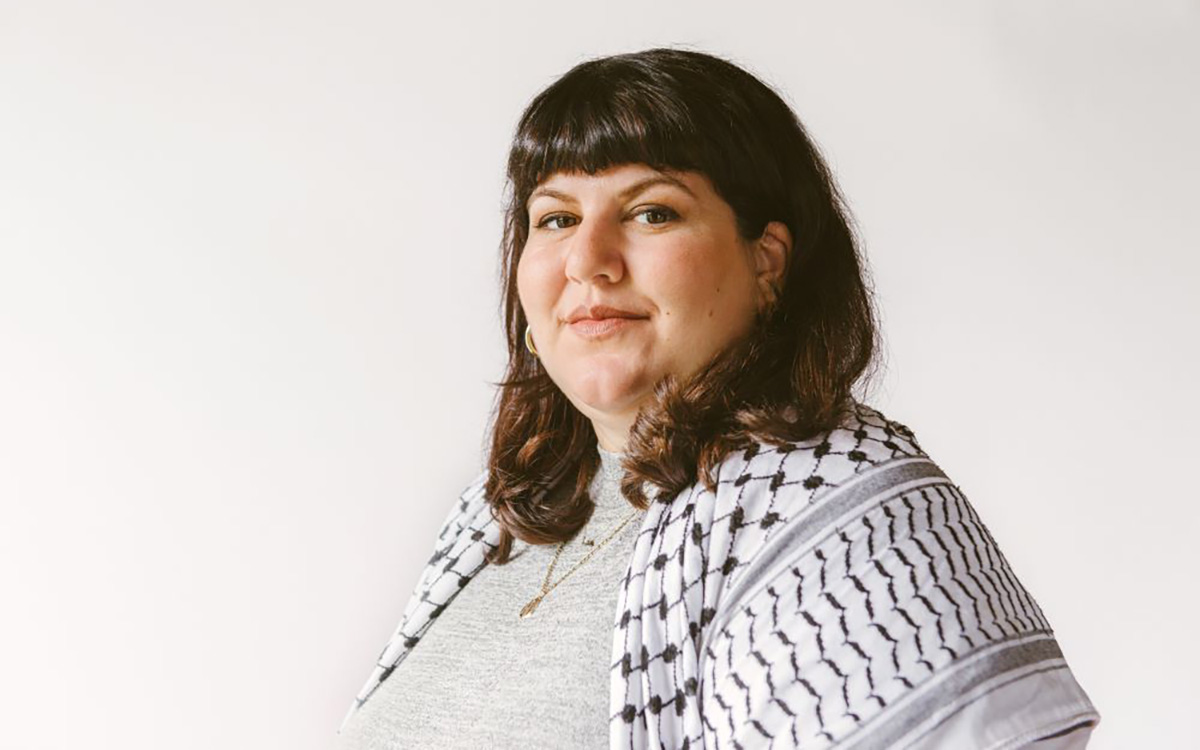
Monday marks a year since Oct. 7.
The Israeli government says militants on that day killed roughly 1,200 people, including upwards of 360 partygoers at the Nova Music Festival near Re’im, a kibbutz that is a couple miles from the Gaza border. The Israeli government says the militants also kidnapped more than 200 people on Oct. 7.
The Hamas-controlled Gaza Health Ministry says Israeli forces have killed more than 41,000 people in the enclave since Oct. 7.
Hamas, which the U.S. and Israel have designated a terrorist organization, claimed responsibility for an Oct. 1 attack at a Tel Aviv light rail station that left seven people dead and more than a dozen others injured. A Bedouin man on Sunday killed an Israel Border Police officer and injured 10 others when he attacked a bus station in Beersheva in southern Israel on Sunday.
Reuters on Friday reported the Lebanese Health Ministry said Israeli airstrikes in Beirut and elsewhere in the country over the last two weeks have killed more than 2,000 people. Iran last Tuesday launched upwards of 200 ballistic missiles at Israel in response to an Israeli airstrike in the Lebanese capital on Sept. 27 that killed Hassan Nasrallah, the long-time leader of Hezbollah, an Iran-backed militant group.
An Israeli airstrike in the West Bank city of Tulkarem on Oct. 3 killed 18 people in a Palestinian refugee camp.
The Israel Defense Forces and Shin Bet, the country’s security agency, said the airstrike killed Zahi Yaser Abd al-Razeq Oufi, a senior Hamas commander, and 11 other Hamas operatives. The Associated Press reported the airstrike also killed a family of four, including two young children.
The AP cites Palestinian officials who say an Israeli airstrike on a mosque in Deir al-Balah, a town in central Gaza, killed at least 19 people.
The International Criminal Court in May announced it plans to issue arrest warrants for Israeli Prime Minister Netanyahu, Israeli Defense Minister Yoav Gallant, and three Hamas leaders — Yehya Sinwar, Mohammed Deif, and Ismail Haniyeh.
Karim Khan, the ICC’s chief prosecutor, said the five men have committed war crimes and crimes against humanity in Gaza and Israel. (A suspected Israeli airstrike on July 31 killed Haniyah while he was in the Iranian capital of Tehran to attend Iranian President Masoud Pezeshkian’s inauguration.)
The Montreal-based Queering the Map — a “community generated counter-mapping platform for digitally archiving LGBTQ2IA+ experience in relation to physical space” — is an “interface to collaboratively record the cartography of queer life.” Several people who have used Queering the Map are from Gaza.
A person who placed their post near Netzarim Junction in central Gaza notes it was the place where they fell in love with someone in 2021, “the last major Israeli bombardment on Gaza.” The person notes their beloved is a student who has left the enclave.
“Israeli occupation bombs may take everyone and everything you ever loved away: Your mom, your home, your memories,” they wrote in on Queering the Map. “I am so sorry the world failed you, that your mom, sister, best friends, everything is lost in this genocide.”
Another person who used Queering the Map posted their message near Beit Hanoun, a city in the northeast corner of the Gaza Strip. The Israeli city of Sderot less than four miles away.
“IDK how long I will live so I just want this to be my memory here before I die,” reads the post. “I am not going to leave my home, come what may.”
“My biggest regret is not kissing this one guy. He died two days back. We had told (sic) how much we like each other, and I was too shy to kiss last time. He died in the bombing. I think a big part of me died too. And soon I will be dead. To Younus, I will kiss you in heaven.”
The posts do not indicate when their authors wrote them. The Blade on Saturday heard Israeli airstrikes in Gaza while at the Nova Music Festival memorial and in Yad Mordechai, a kibbutz that is roughly three miles north of the Erez crossing between Israel and Gaza.
Moushabeck told the Blade she helped raise funds that allowed her friend, his wife, and two children to leave Gaza and relocate to Cairo. Moushabeck also said she receives photos from other friends who remain inside the enclave.
“Seeing things happen in the news, and then getting personal video, not a video, but a personal video from my friend who’s watching the same things unfold; that was really horrifying,” she said.
“I’m safe, and I have a lot of privileges living in the diaspora, and so I felt it was my responsibility to bear witness to these,” added Moushabeck.

Tarek Zeidan, the former executive director of Helem, a Lebanese LGBTQ rights group, has launched a fundraiser for a group of transgender women who Israeli airstrikes have made homeless. The campaign has raised more than $19,000.
“While it is contradictory to be focusing on any specific community, vulnerable or otherwise, at a time when entire populations in Lebanon and Gaza are being indiscriminately eliminated, the bitter reality is that humanitarian aid and services will not be available to the majority of queer people in need, especially trans* and non-conforming members of our community,” wrote Zeidan in his appeal.
“Many humanitarian organizations are not capable or even willing to help, and are now even less likely to given that it is a crisis response,” he added. “We learned this hard lesson during the pandemic and in the aftermath of the 2020 Beirut port explosion and since then little has changed.”
Outright International, National LGBTQ Task Force have called for Gaza ceasefire
Outright International and the National LGBTQ Task Force are two of the many LGBTQ organizations in the U.S. and around the world that have called for a ceasefire in Gaza.
Upwards of 200 people in February marched from Dupont Circle to the Human Rights Campaign and called upon it and other LGBTQ rights groups to “demand an end to the genocide and occupation of Palestine.” No Pride in Genocide, which describes itself as a “coalition of queer and trans Palestinians, Arab, and SWANA (Southwest Asian and North African) people, Jews, and allies,” organized the event.
“As a queer Palestinian, my identity has sort of been weaponized against us for what is ostensibly a propaganda campaign by the State of Israel,” Moushabeck told the Blade. “We refer to it as ‘pinkwashing.’ They have pumped millions of dollars into what they call Brand Israel in order to project this idea of a queer utopia, queer haven, which, you know, a lot of Israelis say is not accurate.”
“Certainly, Palestinians are not being asked their sexuality is before their homes are bombed or their families are killed,” she added.
Moushabeck also criticized HRC.
“We have organizational leaders like the Human Rights Campaign who are taking money from war profiteers like weapons manufacturer, Northrop Grumman, giving social capital to those profiting off of this violence,” she said.
Subeaux echoed Moushabeck.
“Our narrative of survival in the United States and in the West for queer rights is being co-opted to fear monger,” said Subeaux. “I don’t want that to be done on my behalf. I don’t want a genocide to be done on my behalf. I don’t want a genocide to be done on queer people’s behalf.”

Editor’s note: International News Editor Michael K. Lavers will be on assignment in Israel through Oct. 9.
TEL AVIV, Israel — It has been quiet in Israel’s largest city since I arrived on Friday afternoon.
An Israeli airstrike in Beirut, the Lebanese capital, on Sept. 27 killed Hassan Nasrallah, the long-time leader of Hezbollah, an Iran-backed militant group. Iran on Oct. 1 launched upwards of 200 ballistic missiles at Israel.
Rosh Hashanah ended on Friday.
Monday will mark a year since Hamas launched its surprise attack against southern Israel from the Gaza Strip. The group, which the U.S. and Israel have designated a terrorist organization, claimed responsibility for an Oct. 1 attack at a Tel Aviv light rail station that left seven people dead and more than a dozen others injured.
The Hamas-controlled Gaza Health Ministry says Israeli forces have killed more than 41,000 people in the enclave since Oct. 7. Reuters on Friday reported the Lebanese Health Ministry said Israeli airstrikes in Beirut and elsewhere in the country over the last two weeks have killed more than 2,000 people.
An Israeli airstrike in the West Bank city of Tulkarem on Thursday killed 18 people in a Palestinian refugee camp.
The Israel Defense Forces and Shin Bet, the country’s security agency, said the airstrike killed Zahi Yaser Abd al-Razeq Oufi, a senior Hamas commander, and 11 other Hamas operatives. The Associated Press reported the airstrike also killed a family of four, including two young children.
The International Criminal Court in May announced it plans to issue arrest warrants for Israeli Prime Minister Netanyahu, Israeli Defense Minister Yoav Gallant, and three Hamas leaders — Yehya Sinwar, Mohammed Deif, and Ismail Haniyeh.
Karim Khan, the ICC’s chief prosecutor, said the five men have committed war crimes and crimes against humanity in Gaza and Israel. (A suspected Israeli airstrike on July 31 killed Haniyah while he was in the Iranian capital of Tehran to attend Iranian President Masoud Pezeshkian’s inauguration.)

Here are some things I have seen since I arrived in Tel Aviv.
• Banners that read “Bring Them Home Now!” in reference to the hostages who remain in Gaza are on overpasses and buildings throughout the city. Several people who were jogging along Tel Aviv’s seafront promenade on Saturday morning were wearing “Bring Them Home Now!” t-shirts.
• “FCK HMS” stickers are on streetlights across Tel Aviv.
• I could not access Al Jazeera’s website on Saturday. (The Israeli government in May banned the Qatar-based network from working in the country, and shut down its bureaus in East Jerusalem and Nazareth, a predominantly Arab city in northern Israel. A judge in June extended the ban for 45 days. Israeli soldiers on Sept. 22 raided Al Jazeera’s bureau in Ramallah, the Palestinian capital, and ordered its closure for 45 days.)
• Two men and a woman who were wearing nightclub wrist bands were sitting on beach chairs at Hilton Beach at around 8 a.m. on Saturday and talking about traveling to the Philippines and Thailand. A helicopter with what appeared to be two missiles attached to it flew south along the city’s seafront while swimmers, kayakers, and paddleboarders were in the water.
• A middle-aged man who was wearing an IDF uniform had a machine gun strapped across his body while he had dinner with his family at a restaurant on Friday night.



The situation in Gaza, in northern Israel, in Lebanon, and on the West Bank is obviously very different than in Tel Aviv.
The events of the last year have been horrific for LGBTQ communities in Israel, in Palestine, and throughout the region. The Los Angeles Blade remains committed to documenting this impact while on the ground in Israel.
Israel
Blade returns to Israel to cover Oct. 7 anniversary
Middle East on the brink of a regional war

International News Editor Michael K. Lavers will be on assignment in Israel through Oct. 9.
Lavers will be in the country on Oct. 7, a year after Hamas launched its surprise attack against Israel, and will cover how the country’s LGBTQ community has coped with that horrible day and its ongoing aftermath. Lavers will also cover how the war in the Gaza Strip has impacted LGBTQ Palestinians — in both Gaza and the West Bank and among the Palestinian diaspora in the U.S.
Lavers arrived in Israel three days after Iran launched upwards of 200 ballistic missiles at the country.
An Israeli airstrike in Beirut, the Lebanese capital, on Sept. 27 killed Hassan Nasrallah, the long-time leader of Hezbollah, an Iran-backed militant group.
Hezbollah since last October has launched rockets into northern Israel. The Israeli military earlier this week began a ground incursion into southern Lebanon.
“The horrific events of Oct. 7 and their aftermath have impacted LGBTQ people in Israel, in the Gaza Strip, in the West Bank, in Lebanon, and elsewhere throughout the Middle East and around the world,” said Lavers. “It is critically important for the Washington Blade to document the situation on the ground, and to show how the horrific events of the last year have impacted LGBTQ communities throughout the region.”
“We are committed to objective coverage of the situation in the Middle East and to highlighting the plight of LGBTQ Palestinians and Israelis caught up in the war,” said Blade editor Kevin Naff. “The generous support of our readers enables this coverage so please consider making a donation at bladefoundation.org to ensure the Blade’s 55-year record of award-winning journalism continues.”
Israel
Gay Israeli man’s sister-in-law among six hostages killed in Gaza
Hamas militants took Carmel Gat hostage on Oct. 7, 2023
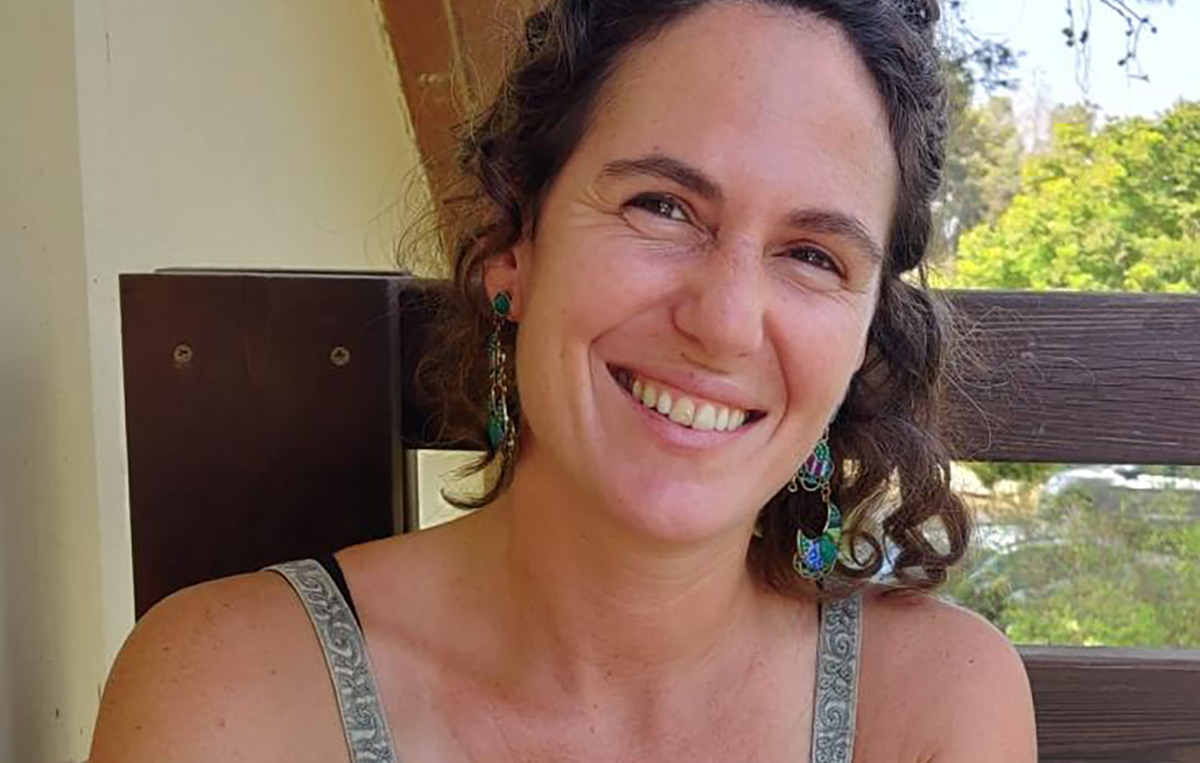
The Israeli government on Sunday announced a gay man’s sister-in-law and five other hostages were killed in the Gaza Strip before they could be rescued.
The Israeli Foreign Affairs Ministry in a press release said members of the Israel Defense Forces on Saturday “located” Carmel Gat’s body. The IDF also found the bodies of Hersh Goldberg-Polin, Ori Danino, Alexander Lobanov, Almog Sarusi, and Eden Yerushalmi.
The Associated Press said IDF forces found the bodies in a tunnel underneath Rafah, a city in southern Gaza that borders Egypt. Haaretz, an Israeli newspaper, reported Israeli officials said the hostages “were shot at close range” by Hamas militants on Aug. 29 or Aug. 30.
“This is a difficult day for us,” said Prime Minister Benjamin Netanyahu in a video message. “Together with all citizens of Israel, I was outraged to the depths of my soul by the horrific, cold-blooded murder of six of our hostages.”
“I say to the Hamas terrorists who murdered our hostages and I say to their leaders: You will pay the price,” he added. “We will not rest, nor will be silent. We will pursue you, we will find you, and we will settle accounts with you.”
Gat was visiting her parents in Be’eri, a kibbutz that is near the border of Israel and Gaza, on Oct. 7, 2023, when Hamas launched a surprise attack against southern Israel from the Palestinian enclave it governs.
Hamas militants killed Gat’s parents.
They kidnapped Gat and her sister-in-law, Yarden Roman, and brought them to Gaza. Roman’s husband, Alon Gat, with their young daughter, Geffen, jumped out of the car in which the militants had placed them and escaped before it drove into Gaza. Hamas, which the U.S. has designated as a terrorist organization, released Roman on Nov. 29, 2023.
The Jerusalem Post reported Carmel Gat, an occupational therapist, while in Gaza taught other hostages yoga and meditation to help them endure their captivity.
Her brother-in-law, Gili Roman, a teacher who is a member of Israel’s Nemos LGBTQ+ Swimming Club, included a broken heart emoji in a brief email exchange with the Washington Blade on Sunday.
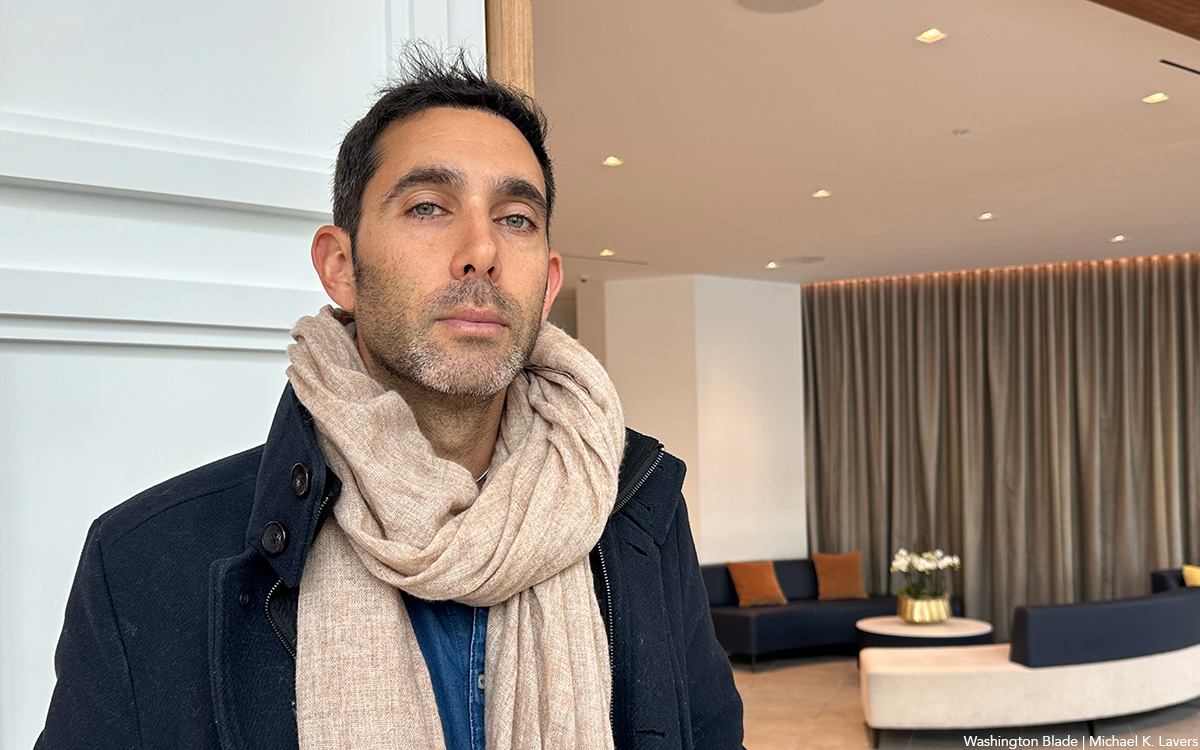
The Israeli government says Hamas militants killed roughly 1,200 people on Oct. 7, including upwards of 370 partygoers and others at an all-night music festival in Re’im, a kibbutz that is a few miles southwest of Be’eri. Carmel Gat was one of the upwards of 250 people who Hamas militants took hostage.
The Hamas-controlled Gaza Health Ministry says more than 40,000 people have died in the enclave since the war began.
The Washington Post reported an 11-month-old boy in Gaza contracted polio last month, and there are several other suspected cases. UNRWA, the U.N. agency for Palestinian refugees, and the World Health Organization on Sunday began a mass polio vaccination campaign.
Hezbollah, which the U.S. and Israel have designated a terrorist organization, has launched rockets from Lebanon into northern Israel. The Houthis have also launched rockets towards Israel and have attacked commercial ships in the Red Sea.
Iran, which backs the Houthis and Hezbollah, on April 13 launched a drone and missile attack against Israel in response to a suspected Israeli air strike killed two Iranian generals in Damascus, Syria.
An Israeli air strike on July 30 in Beirut killed a senior Hezbollah commander. A suspected Israeli strike in Tehran, Iran, the following day killed Ismail Haniyah, Hamas’s top political leader.
Goldberg-Polin’s parents, Jon Polin and Rachel Goldberg, spoke at the Democratic National Convention in Chicago on Aug. 21.
‘We did not do enough to save our Carmel’
Hundreds of thousands of people on Sunday took to the streets of Tel Aviv, Jerusalem, and other cities and towns across Israel to demand Netanyahu agree to a ceasefire that would secure the remaining hostages’ release.
Carmel Gat’s family in a statement to the Jerusalem Post on Sunday said it refused to meet with Netanyahu.
“We have no interest in speaking with the person responsible for Carmel’s death or in being part of his media circus,” said the family. “We will not allow him to use us as justification or legitimacy for the murder of the next hostage. The blood of the hostages is on his hands.”
“We did not do enough to save our Carmel,” it added. “We ask that for the memory of Carmel and for the rescue of the hostages still in captivity — take to the streets and shut down the country until everyone comes home.”
A Wider Bridge in an email it sent to supporters on Sunday said “the horrifying news of the Hamas murder of six hostages — Ori Danino, Carmel Gat, Hersh Goldberg-Polin, Alexander Lobanov, Almog Sarusi, and Eden Yerushalmi — cuts deep.”
“In a sense, they are all our family,” reads the email. “The six were found executed in a tunnel in Rafah as their rescue was becoming a possibility.”
A Wider Bridge said it also “came to know Hersh through his parents’ advocacy, which brought his story and the plight of all the hostages to millions.” The email also notes A Wider Bridge “has also grown close to the family of Carmel Gat” since Oct. 7.
“She was stolen from Kibbutz Be’eri along with her sister-in-law, Yarden,” said A Wider Bridge. “Yarden’s brothers, Gili and Nili, are gay men active in the Israeli LGBTQ community and involved in the hostage families group. They have spoken with our community on several AWB programs. We exhaled a little when Yarden was released from the hellscape in which her cousin remained, and we are devastated by their pain today at the execution of Carmel.”
-

 Breaking News3 days ago
Breaking News3 days agoMajor victory for LGBTQ funding in LA County
-

 Features3 days ago
Features3 days agoKoaty & Sumner: Finding love in the adult industry
-

 Commentary1 day ago
Commentary1 day agoBreaking the mental health mold with Ketamine: insights from creator of Better U
-

 Miscellaneous3 days ago
Miscellaneous3 days agoCan you really find true love in LA? Insights from a queer matchmaker
-

 El Salvador4 days ago
El Salvador4 days agoLa marcha LGBTQ+ desafía el silencio en El Salvador
-

 Arts & Entertainment3 days ago
Arts & Entertainment3 days agoIntuitive Shana gives us her hot take for July’s tarot reading

